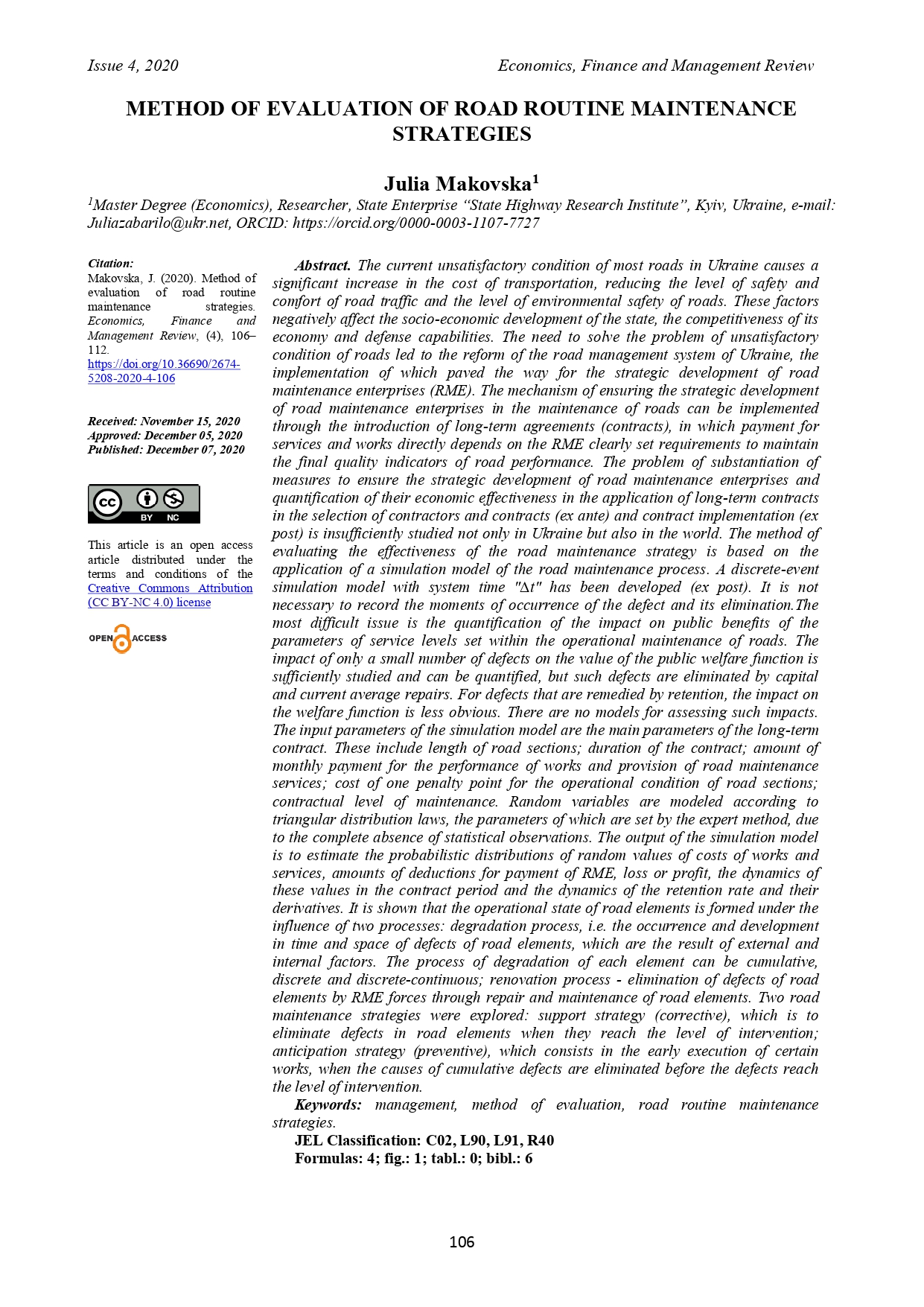METHOD OF EVALUATION OF ROAD ROUTINE MAINTENANCE STRATEGIES
DOI:
https://doi.org/10.36690/2674-5208-2020-4-106Keywords:
management, method of evaluation, road routine maintenance strategiesAbstract
The current unsatisfactory condition of most roads in Ukraine causes a significant increase in the cost of transportation, reducing the level of safety and comfort of road traffic and the level of environmental safety of roads. These factors negatively affect the socio-economic development of the state, the competitiveness of its economy and defense capabilities. The need to solve the problem of unsatisfactory condition of roads led to the reform of the road management system of Ukraine, the implementation of which paved the way for the strategic development of road maintenance enterprises (RME). The mechanism of ensuring the strategic development of road maintenance enterprises in the maintenance of roads can be implemented through the introduction of long-term agreements (contracts), in which payment for services and works directly depends on the RME clearly set requirements to maintain the final quality indicators of road performance. The problem of substantiation of measures to ensure the strategic development of road maintenance enterprises and quantification of their economic effectiveness in the application of long-term contracts in the selection of contractors and contracts (ex ante) and contract implementation (ex post) is insufficiently studied not only in Ukraine but also in the world. The method of evaluating the effectiveness of the road maintenance strategy is based on the application of a simulation model of the road maintenance process. A discrete-event simulation model with system time "∆t" has been developed (ex post). It is not necessary to record the moments of occurrence of the defect and its elimination.The most difficult issue is the quantification of the impact on public benefits of the parameters of service levels set within the operational maintenance of roads. The input parameters of the simulation model are the main parameters of the long-term contract. These include length of road sections; duration of the contract; amount of monthly payment for the performance of works and provision of road maintenance services; cost of one penalty point for the operational condition of road sections; contractual level of maintenance. Random variables are modeled according to triangular distribution laws, the parameters of which are set by the expert method, due to the complete absence of statistical observations. The output of the simulation model is to estimate the probabilistic distributions of random values of costs of works and services, amounts of deductions for payment of RME, loss or profit, the dynamics of these values in the contract period and the dynamics of the retention rate and their derivatives. The process of degradation of each element can be cumulative, discrete and discrete-continuous; renovation process - elimination of defects of road elements by RME forces through repair and maintenance of road elements. Two road maintenance strategies were explored: support strategy (corrective), which is to eliminate defects in road elements when they reach the level of intervention; anticipation strategy (preventive), which consists in the early execution of certain works, when the causes of cumulative defects are eliminated before the defects reach the level of intervention.
Downloads
References
Soliño A.S. Optimización de la transferencia de riesgos en los Contratos de Infraestructuras y Servicios Públicos / Antonio Sánchez Soliño // Hacienda Pública Española / Review of Public Economics, 201-(2/2012): 67-91 Universidad Politécnica de Madrid, Recibido: Julio, 2012. URL: https://www.ief.es/docs/destacados/publicaciones/revistas/hpe/201_Art3.pdf (Accessed 19.02.2020).
Soliño A.S. Application of the Agency Theory for the Analysis of Performance Based Mechanisms in Road Management / Antonio Sánchez Soliño // 13th World Conference on Transport Research 15-18 july 2013 Rio de Janeiro, Brazil. 14 p. URL: https://journals.open.tudelft.nl/index.php/ejtir/article/view/3092 (Accessed 20.07.2019).
Soliño A.S. Optimizing performance-based mechanisms in road management: an agency theory approach / Antonio Sánchez Soliño // European Journal of Transport & Infrastructure Research . 2015, Vol. 15 Issue 4, p.465-481URL: https://journals.open.tudelft.nl/index.php/ejtir/article/view/3092 (Accessed 20.07.2019).
Soliño A.S., de Santos P.G. Niveles óptimos de calidad y costes de transacción en la contratación de servicios públicos / Antonio Sánchez Soliño, Pilar Gago de Santos // URL: http://oa.upm.es/32298/1/INVE_MEM_2013_177039.pdf (Accessed 20.07.2019).
Gupta D., Vedantam A., Azadivar J. Optimal Contract Mechanism Design for Performance-Based Contracts / Diwakar Gupta, Aditya Vedantam, Justin Azadivar // MN/RC 2011-18 Department of Mechanical Engineering Industrial and Systems Engineering Program University of Minnesota. – 53 p. URL: https://www.lrrb.org/pdf/201118.pdf (Accessed 18.05.2019).
Hanie Teki Tjendani, Nadjadji Anwar and I Putu Artama Wiguna Two stage simulation to optimize risk sharing in performance-based contract on national road a system dynamic and game theory approach // ARPN Journal of Engineering and Applied Sciences, VOL. 13, NO. 15, AUGUST 2018. – Pp. 4432-4439. URL: http://www.arpnjournals.org/jeas/research_papers/rp_2018/jeas_0818_7221.pdf (Accessed 20.03.2020).

Downloads
Published
How to Cite
Issue
Section
License

This work is licensed under a Creative Commons Attribution-NonCommercial 4.0 International License.








